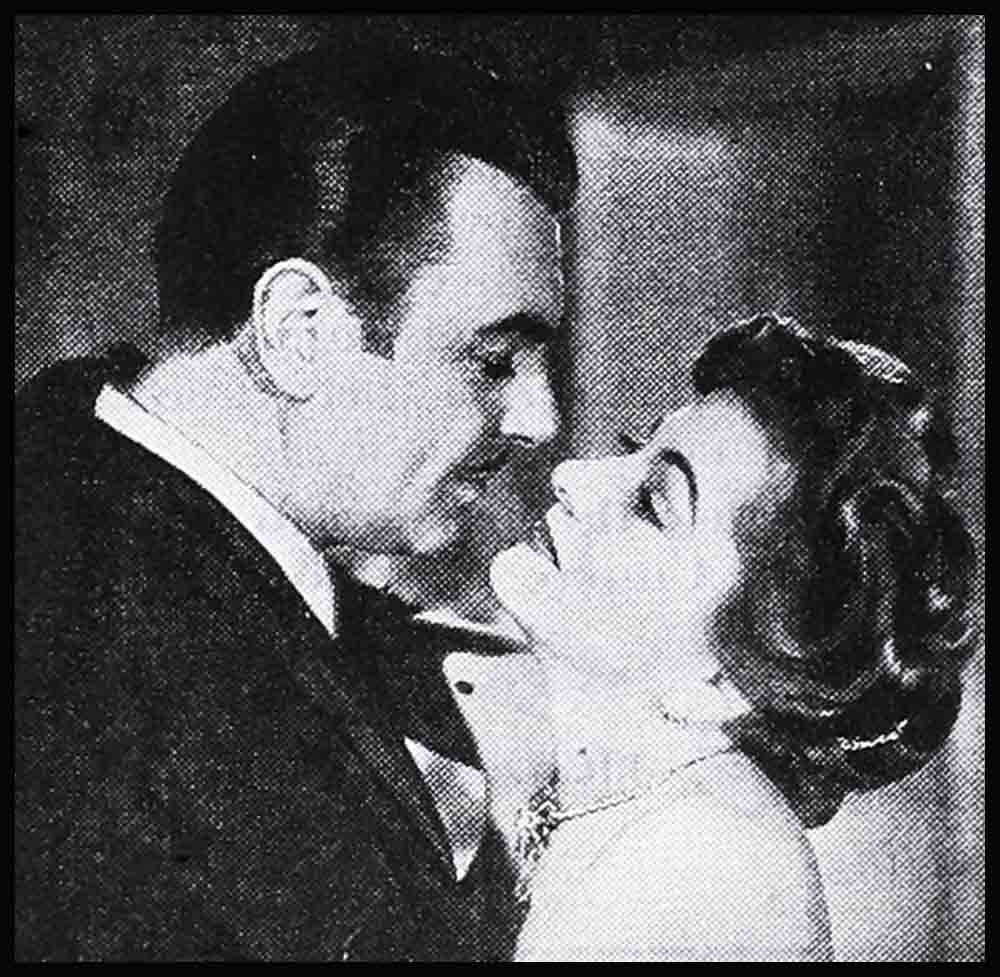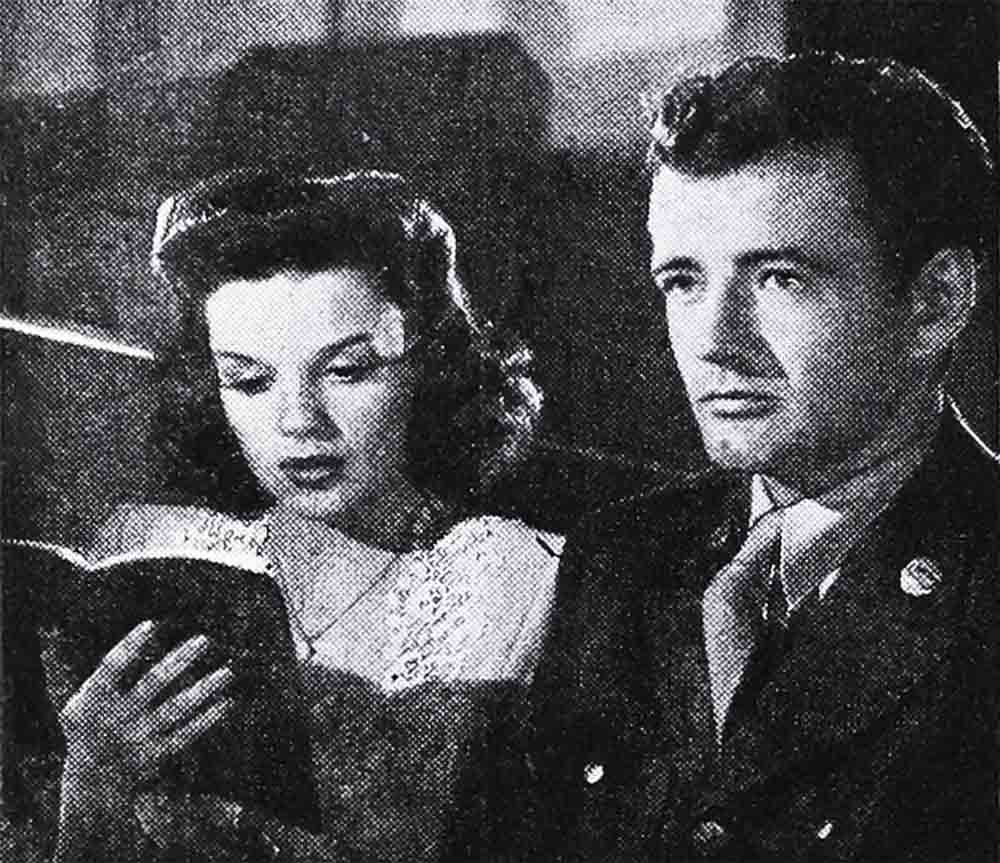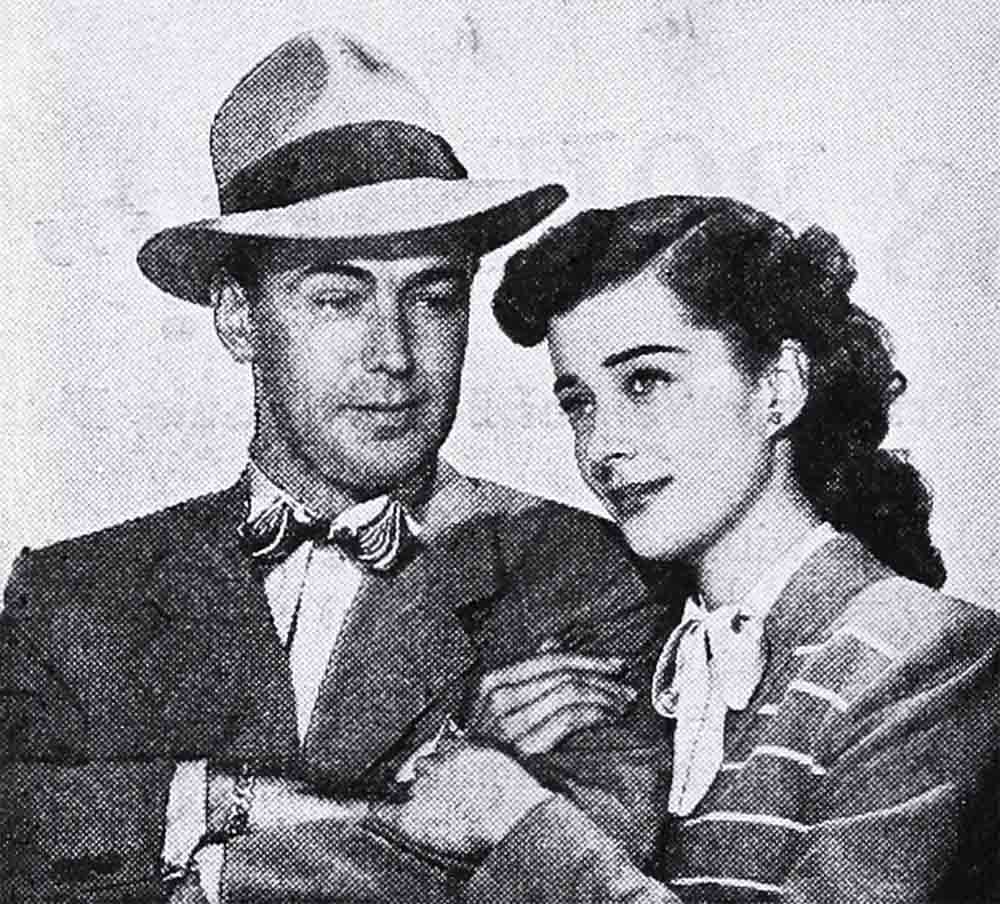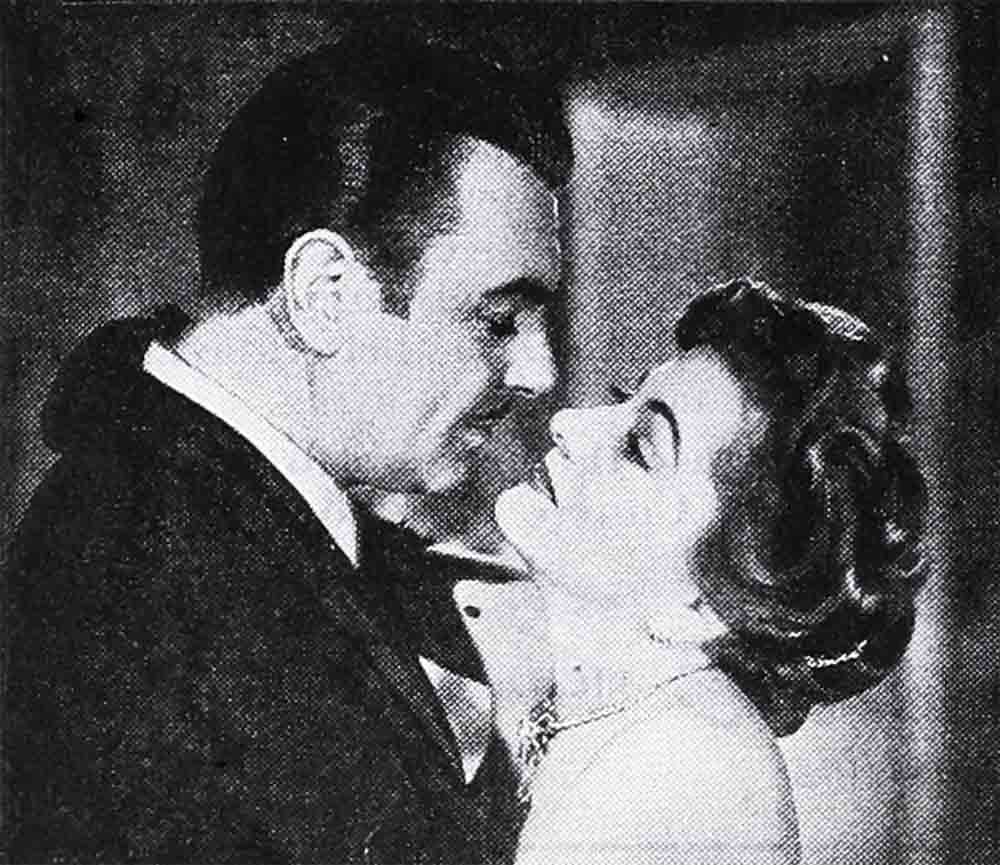
Go Out To A Movie

Love—it comes suddenly, tenderly, beautifully and compellingly into the hearts of Robert Walker, a corporal on a short leave, and Judy Garland, secretary in the city of New York.
It marches around the hours of the clock in a succession of thrilling moments that, in tum, bring laughter, tears and sympathetic understanding, all of which makes for a sure-fire picture that will appeal especially to the romantic minded.
It is unquestionably a “director’s picture” with the brilliant touches of director Vincente Minnelli at times outshining the story itself with its message that love transforms the humblest into shining storybook people.
Judy, with nary a song, except the one in her heart, comes into her own as a dramatic actress of depth and charm. Robert Walker, the boy who is bewildered by his headlong collision with love, gives one of the best performances we’ve glimpsed in a moon’s age. There’s an authoritative sincerity about Walker that will secure him steadfast in the hearts of his fans.
For a bit that outshines everyone and everything about it, we nominate Keenan Wynn in his brief scene as the realistically inebriated gentleman of the lunchroom. What a gem of a performance! James Gleason as the milkman and Lucile Gleason as his wife take over with Judy and Robert for a four-handed game of perfection in acting (and direction) in a break fast-table scene that other directors should flock in droves to see.
The whole film is a breakdown of exquisite bits that, when strung together, emerges one of the very best of its kind.
Your Reviewer Says: Love time—around the clock.

Alan Ladd, Gail Russell, Bruce Cabot and a lad you’ll remember, Stanley Clements, are sucked into a whirlpool of action and suspense that has the audience going right over the rapids with them.
While it’s not Ladd’s best picture, the way he plays it enhances his firm grip on the fans who love the cold, hard smoothness that precipitated him into focus. And in this one he’s just as cold, just as calculating and just as appealing as ever.
The plot, of course, provides the background for all this frozen emotion dealing with Ladd’s attempts to repay Cabot a debt for which he isn’t responsible but which, because Cabot’s a tough hombre, has to be paid. As a means of quick retribution Ladd buys a mad-minded race horse whom only Stanley Clements can manage. But again there’s a catch. Clements has been barred from all tracks and must needs pose as his younger brother, which sends him into the schoolroom of Gail Russell, and there’s where the love business comes in.
The thing clips along cockily, with events shaping up to high-blood-pressure suspense toward the entangled end.
Clements is simply marvelous as the jockey. Ladd, of course, is up to every inch of his role. William Demarest, Spring Byington and Marjorie Woodworth are good in their little corners, too.
Your Reviewer Says: All the elements of a good movie.

The Affairs Of Susan (Paramount)
Susan, played by Joan Fontaine, was four women to four men, and all of the Susies were interesting, none of them dull, and each one lovelier than the other, which only goes to prove a woman can be anything a man wants her to be, and sometimes is.
The story, a gay, charming şort of thing, rambles on willy-nilly, and if it consumes too much time in the telling, the lightness of its mood somewhat redeems its over-length.
We first meet Susan through George Brent—a New York producer. Honest, naive, frank, childlike and unassuming, Susan marries George, becomes a fine actress who loses her husband through the identical failings that won his heart. When Don DeFore, a Montana lumberman, comes along, Joan has become wiser, a siren out to get, tease and tantalize her man. With author Dennis O’Keefe she becomes the intellectual, the bespectacled young woman of learning who must be rescued from author O’Keefe by Brent and DeFore, always loyal to Susan.
It’s Walter Abel, the stolid solid citizen, she finally decides to marry, however, and who learns about all the various little Susies from her three former swains. The ending has been guessed from the beginning, of course, but stili it has a way of being so darned entertaining it really doesn’t matter.
Rita Johnson is a pretty heavy, if you know what we mean. And Fontaine is really delightful.
Your Reviewer Says: Charm is the word for this affair.
Without Love (M-G-M)
Vitamin a, vitamin B, plus a dash of high-powered paprika has been needled into the situations and dialogue of Philip Barry’s rather dull stage play, “Without Love,” and the results are hilarious. But the premise of the tale? Well, not exactly original is the story of a woman who hides from the world because a past love was too perfect, and a man who is a refugee from love—past imperfect.
Katharine Hepburn is so very Hepburnish as the woman that we had the feeling Katie was kidding us with the best Hepburn imitation to date. Forcefulness, the frightening kind, melts to a kittenishness when Katharine and Tracy, both scientists, marry without love and develop the grand passion along the way.
Just how Carl Esmond, a prospective buyer for Katie’s house, suddenly develops into an amorous suitor is never explained. But no explanation is necessary for Keenan Wynn as Katie’s cousin. His every appearance (especially in the taxicab with Wynn stewed to the eyebrows) is signal for joy among the fans.
Felix Bressart is amusing as a fellow scientist and Lucille Ball equally amusing as the realtor in pursuit of Wynn. Lucille is a gladsome thing to eye and ear and does a bit of plot needling on her own.
If it’s pure (well, not pure exactly) escapist entertainment you seek, light, airy and feathery, “Without Love” is it.
Your Reviewer Says: Try not to laugh.
A Royal Scandal (20th Century-Fox)
A mere incident in the flavorsome life of Catherine the Great has been blown up into a full-fledged movie. The result is a fluffy concoction, good to look at but not exactly satisfactory to a hungry man. The story lacks sufficient body and strength of plot to qualify as a picture of rounded maturity, but we dare anyone not to be amused at some of the risque lines.
Tallulah Bankhead is Catherine. Her lines under the Bankhead skill come to life. What’s more, she looks beautiful. Those years of stage trouping certainly serve her well in this tricky role of Catherine.
Bill Eythe plays the innocent victim of Bankhead’s charm. He looks and acts the part. Charles Coburn as the chancellor is up to every minute of palace intrigue, and Anne Baxter, who loves Eythe, has much too little to do, but does it well. But it’s Bankhead’s picture, make no mistake.
Your Reviewer Says: Naughty, but nice.
For several reasons we found “Counter Attack” an interesting and worth-while picture. One reason is the subdued and well tempered portrayal of Paul Muni whose usual indulgence in artistic posturings has been controlled admirably by director Zoltan Korda.
Another is the well sustained mood— steady, quiet, and in time fascinating.
The story, however, seems a bit untimely and comes too late in the current events of the havoc of this world to create more than average interest. It tells the story of Paul Muni and Marguerite Chapman, Russian guerrilla fighters who find themselves trapped with seven Germans in a cellar.
The psychological battle that is waged between the minds of the peasant Muni and the Prussian officer Harro Meller fastens the interest and holds it.
Larry Parks is a pleasant addition to the cast of a picture that would have proven more interesting a year ago.
Your Reviewer Says: Moody.
A suspenseful, timely tale, enhanced by a spine-tingling musical score, “Hotel Berlin” points the way for Germany’s tomorrow while the stench of its today still reeks in the nostrils.
Changing headlines during the picture’s making account for a lack of focus which is the story’s main weakness. Helmut Dantine, a German Citizen, is presented in a sympathetic light as a member of the underground. And he’s not only handsome in looks but in performance.
Raymond Massey as one of the generals who plotted against Hitler’s life and must needs take his own, exerts a sympathy-getting influence. Newcomer Andrea King gives all sorts of fancy promise as the Nazi actress who thinks of self before love. Miss King has an interesting face, easy assurance and naturalness. Faye Emerson turns in a warm and finely shaded job as the hotel hostess who snitches to the Nazis but redeems herself in her dramatic defense of the Jewish boy she loves.
Peter Lorre, a German professor, is one more member of the cast to rate sympathy with his muddled mind that eventually clears in time to redeem himself.
Your Reviewer Says: Warners even beat the Russians to Berlin.
Where Do We Go From Here? ( 2Oth Century-Fox )
The premise for this story is enough to send one into howls of hysteria, but unfortunately the picture loses something in the translation. Nevertheless, enough of the “fantasy ridiculous” remains to create many a man-sized guffaw.
Fred MacMurray, for instance, is a 4F in love with June Haver who is too busy dating men in uniform to pay her suitor the least attention. So when a genie appears before Fred, after he’s rubbed a lamp collected in a salvage drive, he has one wish to make—to get into the Army. And what’s more he does—only something goes wrong and our hero lands in Washington’s army at Valley Forge. His efforts to make the general realize his friend Arnold is a traitor are ridiculously funny.
His desire to get out of the clutches of the Hessians recalls the genie for another wish—this time the Navy. Only it’s Columbus’s navy, with the usual trials and tribulations of a 1945 swain lost in the discovery of America.
Throughout the story that ends with the Dutch in New Amsterdam, Fred is constantly meeting up with June, in her various past lives, and the girl who really loves him, Joan Leslie.
Of course whom he eventually gets and where he eventually lands is a surprise we’ll leave for you.
Songs and music with Fred on the vocal end intermingle in the various excursions to add pleasantly to the “doings fantastic” at which we guarantee you more than a chuckle.
Fred is wonderful, June and Joan beautiful, Anthony Quinn a perfect Indian, Alan Mowbray an impressive Washington, and Gene Sheldon a splendid, if slightly cockeyed, genie.
Your Reviewer Says: So silly it’s plain funny.
Billy Rose’s Diamond Horseshoe (20th Century-Fox)
Pretty, pretty, pretty are the scenery, costumes, settings and star, Miss Betty Grable, but silly is the story that wends its weary way amongst the music, color and backgrounds.
Dick Haymes is a personable young man, but who in heaven’s name gave him those doll songs to sing? Or is our ear for music slightly cauliflowered? And what ghoul dug up that mildewed story about the lad who has stage ambitions but whose father wants him to be a doctor?
With Billy Rose’s Diamond Horseshoe as a background, the production takes on plenty of glamour and Betty in her first role since motherhood looks as luscious as ever.
William Gaxton as Dick’s father is a good actor who deserves a better story. To Phil Silvers and Beatrice Kay go the comedy honors. Both are amusing and Phil in a routine with Haymes is downright funny. The best of the songs is “I Wish I Knew” which Haymes sings delightfully.
Your Reviewer Says: Oh, you booful doll!
M-G-M has taken the twinkle from June Allyson’s eye and replaced it with a tear, with the result little Miss Allyson proves her right to stardom here and now. As the expectant mother and member of a symphonic orchestra, who learns the meaning of faith through prayer, June gives the best performance of her career.
Not far behind marches little Margaret O’Brien as June’s kid sister, who delivers her lines and performs her scenes with rare understanding. Frankly we resent the “little child shall lead them” character wished upon Maggie, but she manages with much deftness to eliminate the excess saccharine through her dead-pan clowning with Durante who is tops in every department. Wait till you hear his “Umbriago” number.
The music flows in great golden chunks from the screen and Jose Iturbi, both as orchestra leader and pianist, is one musician who knows how to get right into the feel of the story itself. Mr. Iturbi is not only a great musician but a splendid actor, let it be noted.
Larry Adler and his harmonica is another high light in a story that hits the high spot in music. Marsha Hunt, Marie Wilson, Hugh Herbert and every member of the orchestra deserve bouquets of their own.
Your Reviewer Says: Music from the heart strings.
Salome—Where She Danced (Universal)
A picture you’ll love and why not? It has color, Technicolor at that, romances galore, bravery, daring intrigue and Yvonne De Carlo to send it galloping off to the box office for a smash success.
The scenes are kaleidoscopic, shifting from Berlin to a small Arizona town, then to San Francisco, with never a let-up in pace and excitement. In fact, we ate it up.
Yvonne De Carlo who, through political intrigue, flees Europe with her accompanist J. Edward Bromberg, is a personable young lady for whom we predict a great future. She dances beautifully, sings well and has other accomplishments we must say.
David Bruce is so romantic as the stagecoach robber (this is 1865, folks) who eventually woos the popular De Carlo. Rod Cameron is very good as the newspaperman, also in love with the fair charmer. Walter Slezak is wonderful as the rich San Franciscan and one more victim of the De Carlo charms. We admire as always the smoothness and cleverness of his work.
Albert Dekker, a Prussian count, Marjorie Rambeau, J. Edward Bromberg, Kurt Katch and Abner Biberman are all a part of a truly good movie, wide in scope but closely knit in theme.
Your Reviewer Says: A goodie.
It has Roy Rogers, his horse Trigger and a lot of pretty gals, pretty tunes and pretty scenery, so even if the action is almost nil, it’s still a fair little out-West picture.
The story has Dale Evans, an actress, attempting to raise money to back a show by selling the family ranch she’s never seen. Rogers, who manages the ranch and doesn’t want it sold, steers Dale and sister onto the scrubby ranch owned by Gabby Hayes in the hopes the girls will be discouraged and give up the idea of selling.
But they don’t and by golly it ends up with Roy chasing Grant Withers all through the Chicago stockyards.
The singing is fair and altogether it’s sure to please the Rogers fans.
Your Reviewer Says: Cowboys have more fun than anybody.
Molly And Me (20th Century-Fox)
If the studio hoped, by teaming Monty Woolley and Gracie Fields, to achieve another “Holy Matrimony,” they’re doomed to disappointment, for this misty story of a crusty old recluse, soured by his first marriage, fails to come off.
Gracie, former actress, turns housekeeper and straightens out the misunderstanding between Woolley and his son, Roddy McDowall, shoves his blackmailing wife into some scared-green obscurity, and finally helps Monty to win back his place in the political sun with her cooking. She does a good job but there’s too much indefinite material cluttering up the story for either Monty or Gracie to overcome.
Reginald Gardiner, Edith Barrett and Natalie Schafer are only a few in a cast too strong and too good for the story.
Your Reviewer Says: It’s the stars, not the story.
Universal’s three horsemen, Maria Montez, Jon Hall and Turhan Bey, are together again in another of those Technicolor fancies with Montez a queen, Hail a light-hearted thief and Bey a dashing Egyptian bandit chief.
Montez, whose accent remains the same (and so do her stories) ascends the throne when her father is killed while riding to keep an appointment with Bey. Determined to avenge her father’s death, Maria is imprisoned by George Zucco, adviser to the throne. It’s Hail who rescues her and Bey who wins her, with a lot of gorgeous scenery thrown in.
Rocks roll, tempers flare and ze love—she is made by Maria and Turhan the Bey who is sooo romantic in all those colorful costumes yet. Andy Devine’s comedy is so constrained it’s hardly noticeable.
Your Reviewer Says: Pardon me, haven’t we met before, little picture?
Those who find entertainment satisfaction in gangsterism will probably get a semi-kick out of this whitewashed story of killer Dillinger. The rest of us, wearied of gangster tales, will find in the work of Lawrence Tierney, who plays Dillinger, some little ray of cheer. The lad looks good in both the longshots and close-ups.
A really hand-picked cast when it comes to baddies, Eduardo Ciannelli, Marc Lawrence, Elisha Cook Jr., labor with the stereotyped material that lacks guts and force, seems to us.
Anne Jeffreys is good as the girl who betrays the killer to the FBI. Edmund Lowe seems more the mild-mannered Citizen than a mob leader.
Your Reviewer Says: Why not let sleeping dogs lie?
Shhh! Here come Sherlock and Watson again to busy themselves over the gradual disappearance from this earth (are these trips necessary?) of several elderly gentlemen who have clubbed together in a Scottish manse, aptly called Drearcliff House, to live out their lives in peace and quiet.
It’s the fact that they don’t get to live it out at all that brings our favorite sleuths into this mediocre film that doesn’t matter a gosh darn anyway.
Basil Rathbone and Nigel Bruce are Sherlock and Watson, of course. Aubrey Mather, Dennis Hoey, Paul Cavanagh and Holmes Herbert get mixed up in the business.
Your Reviewer Says: Quick, Watson, a better picture.
It’s the same old formula, friends, of the high-rigger hero who develops fear of high places when his friend is killed in a fail, and who is regenerated in an act of bravery when he rescues his boss Roger Pryor from a way-up-there predicament.
Phyllis Brooks, who runs a lunch wagon with her friend Mary Treen, is the girl who goads and loves Lowery. Joe Sawyer is Mary’s lambie pie, Ralph Sanford is the sheriff. The knock-down, drag-out at the boilermaker’s ball is a lulu. Remind me never to attend one.
Your Reviewer Says: Who dat up dere saying who dat down dere?
Earl Carroll Vanities (Republic)
EARL CARROLL, the man who publicized his cafe with the slogan, “Through these doors pass the most beautiful girls in the world,” is played on the screen by Otto Kruger against a trumped-up story of a princess who wants to sing and dance and, incidentally, to marry a commoner.
Let it be said Constance Moore as the princess does a better job of the singing and dancing than any princess we’ve ever glimpsed in the rotogravure. What’s more, she’s lovely to look at and listen to.
Dennis O’Keefe (how that lad gets around) plays the skit writer who gets the princess. Eve Arden, night club operator, is good so long as she doesn’t sing or dance. In that department she’s strictly outclassed by Miss Moore, who sings a couple of very hummable numbers.
Alan Mowbray is the inebriated prince, Pinky Lee a supposedly funny man, May Forbes a queenly queen, and Parkyakarkus a lunch counter proprietor.
Frankly, none of it adds up to much, but it has music, romance and fun of sorts, and that’s something.
Your Reviewer Says: Such glamorous escape.
Brewster’s Millions (Small-UA)
Ever try to spend a million bucks in sixty days? Dennis O’Keefe does, and the results are not always as funny as they could have been. Or is anything about a million dollars ever very funny?
The story, the one dad and mother chuckled over years ago, has been brought up to date with O’Keefe out of the Army and all set to wed Helen Walker when he learns he’s come into the seven-figure fortune which he must spend within the specified time in order to inherit seven times the amount. Well, everything he touches somehow multiplies rather than decreases, and he has one heck of a time of it with well-meaning friends (unaware of the secret provision in the will) almost gumming up the works at the last minute.
Eddie “Rochester” Anderson is a brunette riot with June Havoc and Mischa Auer also on the funny side of the plot.
Gail Patrick is a booful menace. Nana Bryant, Joe Sawyer and Herbert Rudley also get caught up in the greenback swirl.
Your Reviewer Says: All that dough makes us nervous.
It is a quote. PHOTOPLAY MAGAZINE JUNE 1945




